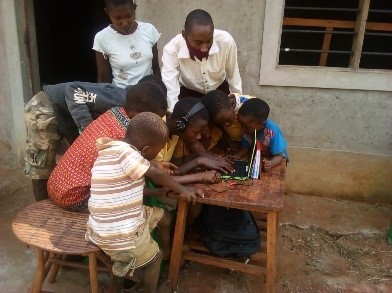Homeschooling: A game changer for special needs students
inableAdmin

The coronavirus pandemic has had a global impact on educational systems. In order to control the spread of the virus, preventive measures such as physical separation and self-isolation were implemented, resulting in the near-complete closure of schools. These school closures highlighted a variety of issues affecting educational access, as well as broader socio economic issues.
In response to school closures, most schools turned to remote learning, which necessitates consistent internet access. However, the high cost of the internet has proven to be a significant barrier to continued learning, particularly for children with disabilities and their families, resulting in interrupted learning and compromised nutrition.
To address this disconnect, inABLE has collaborated with Google, the Department for International Development (DFID), and the Ministry of Education to pilot a homeschool learning project in which 40 Chromebooks laptops and headphones will be distributed to 22 students, 10 interns, and eight teachers from four special schools for the blind in Kenya.
“We acknowledge the ongoing challenges students with special needs have faced as a result of the school closures and found a technology solution to connect them with distance-learning resources,” inABLE Founder & Executive Director Irene Mbari-Kirika.
Chromebooks are designed for use with Google’s educational suite of applications, as well as other Google educational software, such as Google Classroom, G Suite for Education, and even Google consumer applications such as Gmail or Google Keep.
“So far, we have distributed 28 laptops to students and teachers in several counties including Kiambu, Machakos, HomaBay, Meru, Kilifi, Mombasa, Uasin Gishu, Kirinyaga, Embu, Siaya, Kajiado, and Nairobi,” says Peter Okeyo, inABLE Program Manager.
Many parents of special-needs children had to leave work to care for their children, resulting in lost income. “The inABLE homeschooling option was given to me as a gift.
I am grateful that my daughter was chosen because now she will be able to catch up with others in terms of technology once school resumes,” said Beatrice Wamuyi, mother of Hannah Ruguru, a blind student from Kajiado County.
Emily Iminza, mother of Bramwel Lukali, a blind student from Kangemi, Nairobi County, says she is very pleased to see her son happy and able to continue learning at home using this technology.
Brian Munga from Kilifi County is yet another beneficiary of the homeschooling program. “I feel very happy because Brian will now have something to learn. He returned home without a braille book, stylus, or frame. Thank you for giving me confidence that he will catch up with the others,” his mother asserted.